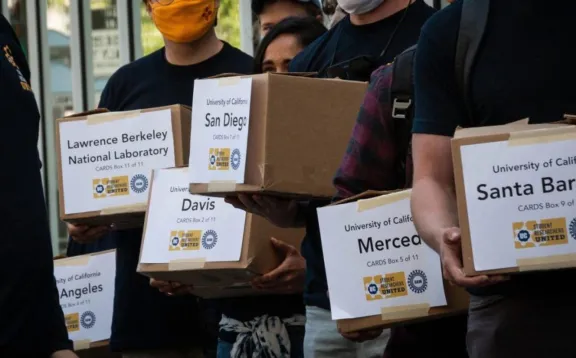
Student Researchers to Hold Strike Vote
The student researcher union, Student Researchers United, is holding a strike authorization vote this week in response to the University of California’s refusal to recognize the union.
Kate Crawford explained that the group decided to authorize the vote, being held from Nov. 10 to 19, after submitting 12,000 cards to the California Public Employment Relations Board (PERB) last May, showing that they had supermajority support of grad students across the state.
“PERB verified our majority in July,” said Crawford, a student in the Bioengineering Program, which is run jointly between UCSF and UC Berkeley. “And the UC has been stalling and delaying now for almost four months by throwing out what we all recognize are stupid arguments.”
Student Researchers United and the University of California are in a standoff after the university denied recognition to the union by failing to recognize all the students who submitted authorization cards.
The university claims that students who are funded through grants and fellowships do not have an employment relationship with the university and do not perform “substantially similar” work as graduate students paid through payroll.
In a letter to the California Public Employment Relations Board on Oct. 21, the University of California stated that the money paid out through fellowships and training grants is not a paycheck, it is a “gift” that has “no strings attached, no required reporting, and no required work.”
Typically, students at UCSF go through several types of funding sources while working toward their degrees. They may move back and forth from payroll to fellowships multiple times while working on the same research project.
On Nov. 2, union members at UCSF elected two members to a statewide strike committee. If two thirds of student researchers vote to authorize a strike, it does not immediately begin a strike.
Instead, it gives the strike committee the power to determine if and when a strike would happen. This committee also determines what a strike would entail for students at different campuses.
“There’s a few different ways that anyone can participate in a strike,” said Miriam Goldman, a student in the Biomedical Informatics program and one of UCSF’s strike committee representatives.
“The first one is, you just withhold your labor. And that doesn’t mean you stop doing everything and you kill your mice and you kill your cells. You essentially go on vacation. And so, you’re going to take a vacation from doing the work that gets the UC income.
“So, we withhold our labor. You go on vacation, you show up to the picket line if you have time and if you want to. Having people physically at a picket line is a good show of strength. It’s not necessary but it is a good way to show this is something that you care about.”
A union communications officer stated that comparisons to a vacation are not accurate.
Student Researchers United has also been holding rallies at the UC campuses across the state and reaching out to elected officials.
On Oct. 26, thirty members of California’s congressional delegation, led by Congresswoman Katie Porter, signed a letter urging Michael Drake, the President of the University of California, to recognize the Student Researchers United and begin negotiating a contract.
Goldman and Crawford believe that a union will give graduate students more power to decide their working conditions and to push for increased pay, protection from harassment and discrimination, and a more equitable working environment.
“You can say over and over again that these are things that matter and these are things that are important,” Goldman said.
“But you don’t have any power. And if you don’t have any power, and if they don’t come to the bargaining table, or if there is no bargaining table to come to, all you’re going to get is smiles and nods.”
When reached for comment, the University of California Office of the President released the following statement:
“UC believes our graduate student researchers contribute to the University’s key research mission, creating new knowledge. We support our employees’ right to union representation. UC is in ongoing discussions with the United Auto Workers (UAW) and the Public Employment Relations Board (PERB) regarding the final composition of this new bargaining unit.
“The University recognizes the majority of individuals in the petition who should comprise the new bargaining unit: graduate student researchers who are hired as employees to work under the direction of the University.
“However, there are differences in perspectives between UC and the UAW regarding other individuals included in the petition who are not University employees as defined by the Higher Education Employer-Employee Relations Act.
“We hope to resolve this matter in a timely fashion so that good-faith negotiations on the terms and conditions of employment with this new bargaining unit can commence.”



